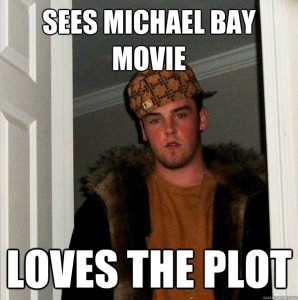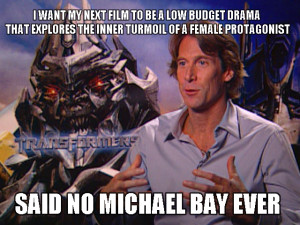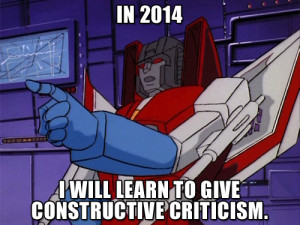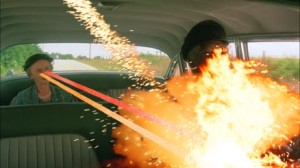Transformers: How I Learned to Stop Thinking and Love Teh Asplosionz
by NorseGamer, HSM Publisher
Tension and release. Tension and release.
The basis of virtually all good storytelling – especially cinematic storytelling – is tension and release. Events build and build, until the tension is practically unbearable, and then finally there is the cathartic release.
What worries me is that with modern cinema – specifically, the summertime blockbuster – this formula has been dramatically altered over the last ten years or so. And not for the better.
Go back and rewatch summertime megahits from the last thirty years. There’s an inexorable push towards not just bigger spectacle, but more spectacle. Constant spectacle. A film like Independence Day, which was one of the biggest summer blockbusters of the last two decades, would by today’s standards be considered ponderously slow. And that’s a bit scary, since ID4 has – to borrow a quip from Harlan Ellison – all the intellectual depth of a bowl of tapioca.
I’m not some jaded hipster who wears a beret and only celebrates obscure films made by French people you’ve never heard of. I like summer spectacles. My generation – those born in the late ‘seventies to early ‘eighties – was the generation that grew up with such films as a staple part of the cinema diet. And they are absolutely a legitimate part of film culture.
And that’s why the growing narrative trend towards all release – and no tension – is really worrying me.

A film in which our hero never throws a punch, gets his best friend killed and loses to the antagonist. Ahhh, story.
It is in the tension – the narrative buildup – that the story takes place. It is in the tension that you grow to actually care about the characters you’re watching onscreen. Let’s take Top Gun as an example: aside from being one of the most quotable films of the last thirty years (something which only comes from good writing, not good effects), the entire movie is a master class in how to structure tension and release in an action movie. The film really only has four explosions in its entire length – and our main hero never even throws a punch – yet it endures as one of the most exciting (and endearing) action movies ever made.
Could you imagine if Top Gun was made today? There’d be no smiling, no brightly-lit scenes, muted colors, and probably way, way too much action. The romance subplot, so integral to the development of both characters, would be reduced to mere window dressing.
Let’s take it one step further. The Empire Strikes Back, which is actually one of the most bizarrely-structured middle-act-of-trilogy films ever made, is filled with long, ponderous scenes of tension buildup. The bulk of the action actually takes place in the first third of the movie, after which nearly the rest of the entire film is tension buildup, as our hero and villain prepare to finally clash for the first time.
By today’s standards for a summer action film, TESB – in the structure we all know and love – wouldn’t have been made.
Contrast this now with the latest Michael Bay Transformers film. Three hours of mindless explosions, with only the most absolutely basic, primal plot devices involved to move the story along from one set piece to the next.
I can’t even remember any of the characters’ names. And the robots are largely indistinguishable from each other – except for perhaps the dinosaurs, which show up so late in the story (for no justifiable reason) that it’s basically the plot throwing up its hands and telling us we’re on our own.
Now, hey, I have no illusions about what I’m going to see when I buy tickets to a Michael Bay film. This guy could film a remake of Driving Miss Daisy and there would still be explosions. And in our era of increasingly sophisticated (and progressively cheaper) home theatre systems, I completely understand the necessity of insane visual spectacle to help drive butts into seats at the local movie house.
Further, the Transformers IP has never exactly been known for its deep storytelling or nuanced characterization. Unlike most kids from my generation, while I enjoyed (and still enjoy) the “giant robot” genre, I never really got into Transformers, preferring instead the more engrossing storytelling of Endless Road SSX or Robotech/Macross. The sad part is that the one moment where Transformers really took some dramaturgical risks – in the original animated movie, where a lot of characters (including the main hero) actually die, and Galvatron reduces Starscream to a pile of ash in one of the most brutally cold scenes ever written for an animated movie – are largely overshadowed by the absolutely ridiculous, pander-to-dumb-kids claptrap that fills the rest of the narrative.
So no, I didn’t go into the latest Transformers film, at the nearby IMAX 3D theatre, expecting any real intelligence with my dose of Bayhem.
What surprised me, though – in a bad way – was just how little attempt was made at any sort of dramatic tension or storytelling.
Here’s the problem: the rise of the internet, and in particular video sharing sites such as YouTube (which today is the second-largest search engine in the world), has created a near-global culture of instant gratification. You don’t want to sit through the whole movie: you just want the really cool highlights, which usually involve stuff blowing up.
In short: we’re a culture that now keeps searching for one release after another, at the expense of all the tension that makes those releases have meaning.
 This isn’t a problem unto itself, necessarily, because first you want to sit through the whole story in order to have an appetite to go back and see the highlights. You want to sit through the tension so that the release has some emotional meaning. Once you’ve sat through it, the highlights are what you want to revisit. No, the problem is when you have a new breed of tentpole movie that arises which is essentially nothing but release, with very little tension to give it any weight.
This isn’t a problem unto itself, necessarily, because first you want to sit through the whole story in order to have an appetite to go back and see the highlights. You want to sit through the tension so that the release has some emotional meaning. Once you’ve sat through it, the highlights are what you want to revisit. No, the problem is when you have a new breed of tentpole movie that arises which is essentially nothing but release, with very little tension to give it any weight.
The Transformers movies are, from a technical standpoint, a tour de force for computer animators and effects artists. Particularly when blown-up on an IMAX screen in 3D, the audiovisual spectacle is simply astonishing. But when that’s all you get for three hours at a stretch, it actually desensitizes you. To borrow from the Bard, this movie is a tale told by an idiot, full of sound and fury, signifying nothing.
Compounding this problem, there are market forces at work which further exacerbate this growing phenomenon. Aside from the aforementioned competition from home theatre systems – which drives studios to create rewatchable experiences that can only be fully appreciated on a big screen with a big audio system (either at home or at the theatre) – movie studios, when producing major tentpole films, rely ever more heavily on international grosses. This means that films with nuanced tension, clever dialogue, etc. run a greater risk of losing something in cultural translation – or, worse, actually offending a particular foreign audience.
This means that the lowest common denominator is no longer Johnny Lunchbucket from Nowheresville, Midwest USA; the lowest common denominator is the dumbest guy in another country, speaking another language, who isn’t yet completely saturated with visual spectacle, who may not have a 4K home theatre system, and needs the most basic storyline imaginable in order to be motivated to plunk down cash.
 Again, this does not mean that summer tentpole movies are bad. Robert Towne may have written the absolutely sublime Chinatown, but when it comes to rewatchability, I’d rather sit through Towne’s Mission: Impossible II (which – although being the dumbest of the four M:I movies – is remarkably adept at hitting emotional moments the other three films have frankly lacked). Nor am I going to tilt at windmills and proclaim that Michael Bay explosionfests should never be made. There’s clearly a market for them, and the market always determines what it wants.
Again, this does not mean that summer tentpole movies are bad. Robert Towne may have written the absolutely sublime Chinatown, but when it comes to rewatchability, I’d rather sit through Towne’s Mission: Impossible II (which – although being the dumbest of the four M:I movies – is remarkably adept at hitting emotional moments the other three films have frankly lacked). Nor am I going to tilt at windmills and proclaim that Michael Bay explosionfests should never be made. There’s clearly a market for them, and the market always determines what it wants.
The concern I have is this: films can get faster, more kinetic, more frantic, and so forth. But at some point, without fundamental storytelling basics and an attempt at telling an interesting story (as opposed to simply providing flimsy justifications for the next action scene) they run the risk of becoming unintelligible. And the latest Transformers movie frankly flirts with that line. Further, just as every rising generation of filmmakers points to what came before it for inspiration, so too will we witness the ripple effect of Michael Bay for years, if not decades, to come.
That may not be such a bad thing, though: in order for the summer tentpole formula to change, its current incarnation must play itself out first, saturating the market to the point where the target audience – no matter how large, across any multitude of countries – simply refuses to spend money for Yet More Bayhem.
Ultimately, there are only about nine basic story types. Yet from this foundation countless stories have arisen. And there is a real art to creating a successful, enduring and rewatchable summer tentpole flick. Err too far on the side of intellect, and you end up with Dark City, which is structurally identical to The Matrix but utterly lacking the standout visual spectacle so needed to attract masses of asses. Err too far on the side of spectacle, and you end up with the latest Transformers movie, which is a completely forgettable explosionfest that leaves you slightly resentful you paid time and money to see it.
The blockbusters which endure the test of time the best are the ones which, like Top Gun or Terminator 2 or The Matrix or The Dark Knight, combine memorable visuals (and, ideally, leitmotifs) with strong, compelling, comprehensible tension.
The latest Transformers film is titled Age of Extinction. And yet, ironically, the only extinction I hope it brings about is its own formula.
Share
| Tweet |




 LinkedIn
LinkedIn Twitter
Twitter
When you actually look at movies as a whole this has been going on for years. Take the Poseidon adventure, towering inferno and airport all from early seventies, all had big name stars and decent effects for the time, and all had sub standard plots and scripts. You went to see them because of between all those films there are some of the biggest stars and effects of that time. The Poseidon adventure was rated as one of the six most successful films ever in 1974. Along with the godfather, sound of music, gone with the wind, love story and the afore mentioned airport as well. Superman was then released in 1978 proving that a comic book character film could have serious money spent on it and still make a profit. But also because of financial constraints around then. Films like battle beyond the stars were being released against the empire strikes backs. Empire cost 15 times more to make than battle beyond the stars but they were released in the same quarter. But battles director hired a little known model maker called James Cameron who went on to be very successful. All the above films are considered a success because of they profits. Transformers made 500 million in 10 days it cost 200 million to make. Success then even though the critics panned it. But earthquake released in 1974 has about the same average critics score as transformers. It cost 7 million to make and made about 36 million initially. Great films that have longevity to them are few. Not just today but as far back before I was born. The difference today is the chance that transformers wins an award is low. Back in the seventies, Poseidon adventure got nominated for 7 or 8 oscars 4 or 5 golden globes and Gene Hackman won best actor bafta. Since then it has become one of the top 100 enjoyable bad movies ever made. Basically the big movies took the b movie concept from the 60’s especially after censorship rules lifted and started making big budget movies with it. And it’s still going on today. But it does mean you get a better b movie now .
:^/ There are times when the audience just wants to marvel at the carnage. And then there are times when we want to care about the carnage. We want the carnage to matter, to have meaning beyond just stuff blowing up.
A good comparison would be the latest Transformers, which destroys Chicago anew, and Marvel’s The Avengers, which destroyed a carefully limited section of New York. Both had the dazzling visual effects that have become standard fare for summer pop-corn flicks, but Avengers spent more time developing the characters first. We grew to care for these fictional people enough that the outcome of the story mattered to us, because their struggles as individuals mattered to us. The Transformers failed to do that.
With Transformers, the only characters repeated from the earlier three films are the robots, and not even all of them are familiar. There was too little time spent establishing the story’s characters as individuals, so I found myself disappointed. What little character development there was seemed intended merely to cue us as to which pigeion-hole archetype each character fits into.
Ultimately, of course, Hollywood will continue to create whatever sells well. In time, enough people may grow jaded to such fare and take a renewed interest in more thought-provoking movies again.
;^) By contrast, our family watched A Beautiful Mind for the first time the other day, having picked it up from a bargain bin a while ago. This is not an action film, and even what action there is isn’t what it seems at first. The story partly a mystery, but even that takes you by surprise. I don’t want to spoil things for folks who haven’t seen it, so I won’t detail things much, but the twists and turns in the story left me uncertain how things were going to turn out. And I cared how it turned out. I wanted Russle Crow’s character to prevail over his situation, because I’d grown to care for him as the story unfolded.
Movies need more of that, man. Even the blockbusters.